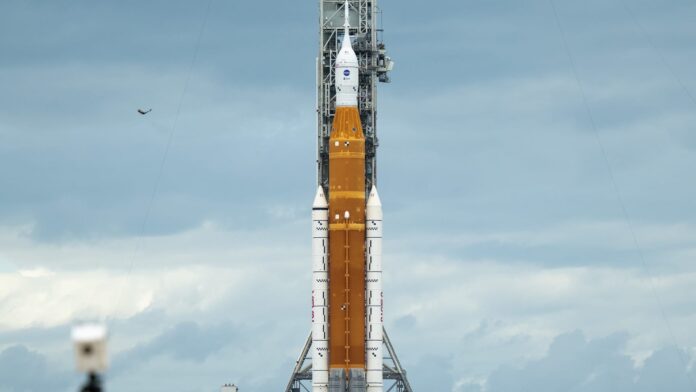It’s launch day for NASA, again.
The space agency is aiming to launch its Artemis I moon mission in the early hours of Wednesday morning, after technical issues delayed previous attempts over the last three months.
The agency’s towering Space Launch System (SLS) rocket and Orion capsule are scheduled to lift off during a two-hour launch window that opens at 1:04 a.m. ET. If successful, the Artemis I mission would last 26 days in total before Orion returns to Earth.
The uncrewed launch marks the debut of the most powerful rocket ever assembled and kicks off NASA’s long-awaited return to the moon’s surface. It’s the first mission in NASA’s Artemis lunar program, which the agency hopes will lead to landing astronauts on the moon by its third mission in 2025.
NASA’s Space Launch System (SLS) rocket and Orion capsule stand in preparation to launch at LC-39B of Kennedy Space Center in Florida, on Nov. 13, 2022.
While Artemis I will not carry astronauts, nor land on the moon, the mission is critical to demonstrating that NASA’s monster rocket and deep space capsule can deliver on their promised abilities.
Artemis I is five years behind schedule and billions of dollars over budget. More than $40 billion has already been spent on the program, much of that toward SLS and Orion’s development. The system comes with a per-launch price tag of $4.1 billion.
NASA first tried to launch Artemis I in August but has called off multiple attempts since then after discovering technical problems with the rocket’s engines.
In September the agency rolled the rocket back into the Vehicle Assembly Building (VAB) for protection from Hurricane Ian, returning the vehicle to the LC-39B launchpad on Nov. 3.
NASA last week left SLS and Orion out on the launchpad to weather the winds of Hurricane Nicole.
NASA said it checked the rocket and spacecraft after the storm passed and found no major damage to the vehicle. It said a 10-foot section of insulation near the Orion capsule had pulled away due to the high winds – but NASA decided to proceed with Wednesday’s launch attempt after an analysis showed it is not expected to cause any significant damage if the insulation falls off during the launch.
If needed, NASA has a back-up launch date scheduled for Nov. 19.


